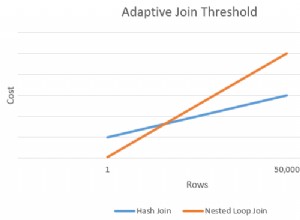To może działać dla Ciebie.
SElECT COUNT(*) AS imgCount FROM (
SELECT imgHeight, imgWidth, imgId AS primaryId FROM primary_images
UNION ALL
SELECT imgHeight, imgWidth, primaryId FROM secondary_images
) AS union_table
WHERE primaryId = $imgId
AND (imgWidth != $maxImageWidth AND imgHeight = $maxImageHeight
OR imgWidth = $maxImageWidth AND imgHeight != $maxImageHeight
OR imgWidth = $maxImageWidth AND imgHeight = $maxImageHeight);
Uważam również, że jest to równoznaczne, chociaż nie jestem pewien.
SElECT COUNT(*) AS imgCount FROM (
SELECT imgHeight, imgWidth, imgId AS primaryId FROM primary_images
UNION ALL
SELECT imgHeight, imgWidth, primaryId FROM secondary_images
) AS union_table
WHERE primaryId = $imgId
AND (imgWidth = $maxImageWidth OR imgHeight = $maxImageHeight);
Zgodnie z żądaniem, oto pojedyncze zapytanie, które zwraca 3 wiersze.
SELECT 'ALL EQUAL' AS COL1,COUNT(*) AS imgCount FROM (
SELECT imgHeight, imgWidth, imgId AS primaryId FROM primary_images
UNION ALL
SELECT imgHeight, imgWidth, primaryId FROM secondary_images
) AS union_table
WHERE primaryId = $imgId AND imgWidth = $maxImageWidth AND imgHeight = $maxImageHeight
UNION ALL
SELECT 'WIDTH EQUAL' AS COL1,COUNT(*) AS imgCount FROM (
SELECT imgHeight, imgWidth, imgId AS primaryId FROM primary_images
UNION ALL
SELECT imgHeight, imgWidth, primaryId FROM secondary_images
) AS union_table
WHERE primaryId = $imgId AND imgWidth = $maxImageWidth AND imgHeight != $maxImageHeight;
UNION ALL
SELECT 'HEIGHT EQUAL' AS COL1,COUNT(*) AS imgCount FROM (
SELECT imgHeight, imgWidth, imgId AS primaryId FROM primary_images
UNION ALL
SELECT imgHeight, imgWidth, primaryId FROM secondary_images
) AS union_table
WHERE primaryId = $imgId AND imgWidth != $maxImageWidth AND imgHeight = $maxImageHeight;




